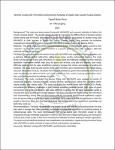| dc.description.abstract | Background: This study was about women living with HIV/AIDS and economic activities in Aduku Sub
County, Kwania district. The specific objectives were to: to examine the different form of business activist
women living with HIV/AIDS are engaged in, assess the challenges encountered by women living with
HIV/AIDS in their business in Aduku sub county, Kwania district. And examine the economic
empowerment strategies for women living with HIV/AIDS in Aduku sub county, kwania district.
Methods: This study employed a cross sectional research design. Cross sectional studies provide a clear
‘snapshot’ of the result and its related variables at a specific point in time. Only qualitative data was
collected and used in the study.
Findings: The study found out that women living with HIV/HIDS were engaged in business activities such
as tailoring, making alcohol, selling fish, selling bread, shops, poultry and livestock keeping. The study
found out that women living with HIV/AIDS in Aduku faced the following obstacles to their business
operations: inconsistent rainfall, high price for goods and services, crop pest and diseases, poor roads,
difficulty obtaining fish for sales, insufficient capital to increase their stocks, and diseases of poultry and
livestock. The study found out that women living with HIV/AIDS were empowered by the Village Saving
and Loan Association (VSLA), microloan from financial institutions, government assistance in the form of
seeds for planning, the DREAM NGO’s provision of chairs for hire, and free training opportunities where
they could pick up practical knowledge and skills.
Conclusion: The study concluded that women living with HIV/AIDS were engaged in variety of
commercial activities, including tailoring, brewing alcohol, baking bread, selling fish, operating stores,
raising poultry, and raising cattle. The study concluded that women living with HIV/AIDS in Aduku
encountered the following challenges in their business activities unreliable rainfall, high prices of goods
and services, crop pests and diseases, bad roads, difficulty in getting fish for sales, inadequate capital to
increase their stock, poultry and livestock diseases. The study concluded that women living with HIV/AIDS
were empowered by saving and Loan Association (VSLA), microloans from financial institutions, support
from the government by giving them seeds for plantings, NGO called DREAM also giving them chairs for
people to hire from them, and they were also given free training where they could learn knowledge and
skills they could use.
Recommendation: The study recommended that women living with HIV/HIDS should be given the tools
they need to manage their own businesses and engage in sustainable agriculture by receiving training in
entrepreneurial skills. The study recommended that woman living with HIV/AIDS should be fully
empowered through knowledge acquisition in order to make them join Village Saving and Loan Association
(VSLA) and to have access to loan from microfinance institution and have training in modern agriculture.
The study recommended that should be mass mobilization and sanitization, regular training of women living
with HIV/HIDS on better methods of crops and birds and livestock management.
Keywords: Women Living with HIV/AIDS, and Economic Activities. | en_US |

